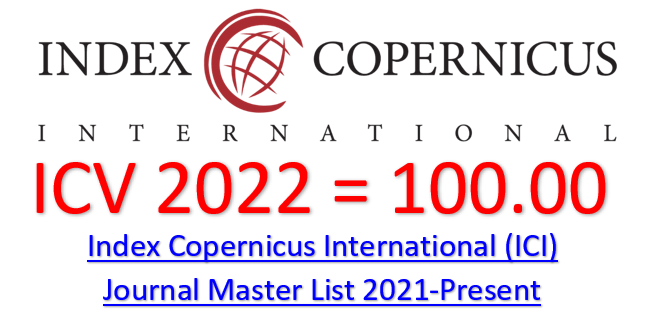Analysis Of Knowledge Levels With Compliance With Antibiotic Use
DOI:
https://doi.org/10.55018/janh.v2i2.95Keywords:
Knowledge, Compliance, Patients with antibiotic treatmentAbstract
Infectious disease is still one of the important public health problems, especially in developing countries. Inappropriate use of antibiotics can cause several effects, namely the occurrence of germ or bacterial resistance. Objective To determine whether there is a relationship between the level of knowledge analysis with the compliance of antibiotic use in outpatients in the Gadung District Health Center. Buol
The design used in this study is Cross Sectional. The population was all outpatients who received antibiotic treatment. The sample size was 42 respondents using total sampling technique. The independent variable of research is knowledge. The dependent variable is compliance. Data were collected using a questionnaire, then data were analyzed using the rho spearment test with a significance level of α ≤ 0.05.
The results showed that almost half of respondents had sufficient knowledge of 18 respondents (42.9%), obedient respondents were 23 respondents (54.8%), the statistical test in this study used the Spearmen's rho test with a <0.05 obtained p = 0,000 where H1 is accepted and H0 is rejected, which means that there is a relationship between the level of knowledge and compliance with the use of antibiotics in outpatients in Gadung District Health Center. Buol
There is a relationship between the level of knowledge analysis with adherence to the use of antibiotics in outpatients in the Gadung District Health Center, Buol
Downloads
References
Asharina, Ilma. 2016. Resistensi Antibiotik Di Indonesia- Tak Usah Dulu Bermain Undang-Undang. Institut Teknologi Bandung
Aspiani, R.Y. 2014. Buku Ajar Asuhan Keperawatan Gerontik. Jakarta: Trans. Info Media.
Badan Penelitian dan Pengembangan Kesehatan. 2018. Riset Kesehatan Dasar (RISKESDAS). Jakarta.
Krisnanta. 2018. Analisis Profil dan Faktor Penyebab Ketidakpatuhan Pengasuh Terhadap Penggunaan Antibiotik pada Pasien Anak. Jurnal Universitas Surabaya. Prosiding Mulawarman.
Neal dan Michael. J. 2006. Medical Pharmacology At Glance Edisi 5. Penerbit Erlangga: Jakarta.
Niven, N. 2012. Psikologi Kesehatan : Pengantar untuk perawat dan tenaga
kesehatan profesional lain. Jakarta: EGC
Notoatmodjo, Soekidjo. 2014. Ilmu Perilaku. Rineka. Cipta. Jakarta.
Notoatmodjo. 2014. Promosi Kesehatan dan Perilaku Kesehatan. Jakarta: Rineka. Cipta.
Nursalam. 2013. Konsep dan penerapan metodologi penelitian ilmu keperawatan. Jakarta: Salemba Medika.
Riskesdas. 2018. Hasil utama Riskesdas 2018. Kemenkes. Jakarta
Sibagariang, 2010, Metodologi Kesehatan Untuk Mahasiswa Diploma Kesehatan, Jakarta. Dalam Ardhany, S.D, Ridha O.A, Yurnida H. “Tingkat Pengetahuan Masyarakat Desa Basawang Kecamatan Teluk Sampit tentang Penggunaan Antibiotik sebagai Pengobatan Infeksi”. Presinding Rakernas dan Pertemuan Ilmiah Tahunan Ikatan Apoteker Indonesia 2016.e-ISSN:2541-0474
Stringer dan Janet . L. 2006. Basic Concepts in Pharmacology: a Student’s Survival Guide. Edisi 3. Buku Kedokteran EGC: Jakarta.
Tamayanti. 2016. Penggunaan antibiotik di dua apotek di Surabaya & 58; identifikasi faktor-faktor yang mempengaruhi kepatuhan pasien. Pharmaciana , Volume 6, Nomor 2
Tombokan, V., Rattu, & Tilaar. 2015. Faktor-Faktor yang Berhubungan dengan
Kepatuhan Berobat Pasien Diabetes Melitus pada Praktek Dokter Keluarga di Kota Tomohon. JIKMU. Vol. 5, No. 5
Tripathi, K. D. 2003. Antimicrobial drugs: general consideration Essential of medical pharmacology Fifth edition. Jaypee: Brothers Medical Publishers.
Utami. 2011. Antibiotika, Resistensi, Dan Rasionalitas Terapi. El-Hayah Vol. 1, No.4 Maret 2011
Ventola, C. Lee. 2015. The Antibiotic Resistance Crisis, Part 2 Management Strategies and New Agents. Journal of Pharmacy and Therapeutic.
WHO. 2015. Global Action Plan On Antimicrobial Resistance. USA: World Health Organization.
WHO. 2015. Worldwide Situatuon Analysis Response to Antimicrobial Resistance. USA:World Health Organization. Halaman 2, 20, 29.
Yarza. 2015. Hubungan Tingkat Pengetahuan Dan Sikap Dengan Penggunaan Antibiotik Tanpa Resep Dokter. Jurnal Kesehatan Andalas.
Yulianto, Rudi. 2014. Pengaruh Kepatuhan Penggunaan Obat Pada Pasien Tuberkulosis Terhadap Keberhasilan Terapi Di Balai Besar Kesehatan Paru Masyarakat Surakarta. Fakultas Farmasi, Universitas Muhammadiyah Surakarta.
Yuniati, Rita. 2016. Kajian Penggunaan Antibiotik Penderita Diare Pada Pasien Pediatrik Di Instalasi Rawat Inap Rsud Abdul Wahab Sjahranie Samarinda. Prosiding Seminar Nasional Kefarmasian Ke-3, Fakultas Farmasi Universitas Mulawarman.
Yuniati. 2016. Kajian Penggunaan Antibiotik Penderita Diare Pada Pasien Pediatrik Di Instalasi Rawat Inap. Press
Downloads
Published
How to Cite
Issue
Section
License

This work is licensed under a Creative Commons Attribution-ShareAlike 4.0 International License.

























